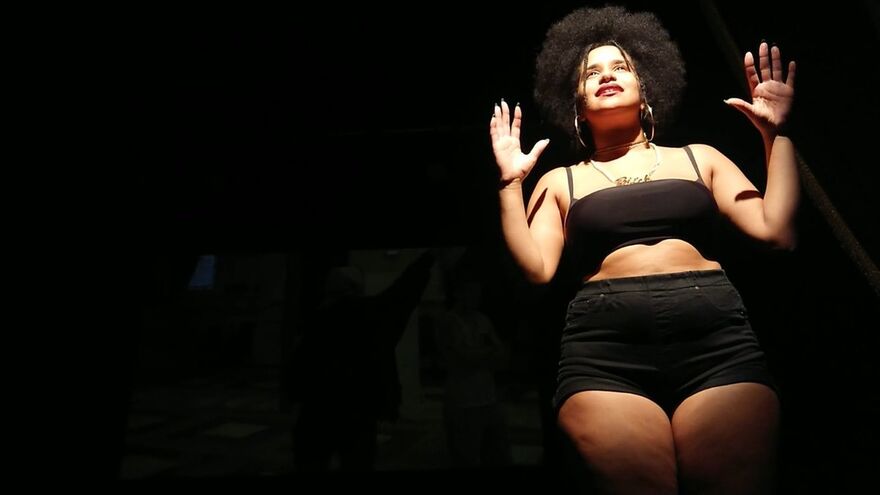
Introducing: Spoken Word Artist Subira Wahogo
This Spring, we present a spoken word showcase Trope in partnership with leading spoken word and poetry organisation Apple and Snakes. Trope will feature top UK artists, local musicians, a poet in residence, poetry film and an open mic.
Each Trope has a theme and this time round we’re tackling ‘Hope’. Where is it? Where does it come from? What would we be without it?We had a chat with Brighton-based, ‘Poet in Residence’ Subira Wahogo to find out more about their journey as a spoken word poet…
Firstly – can you tell us a bit about yourself and what you do?
I’m a spoken word poet. I’m queer and non-binary. I’m black, diasporic African, angry, and an activist.
For those, who aren’t familiar with spoken word – can you tell us a little bit about the art-form?
Spoken word can be all manner of things. For me, spoken word is poetry, but shouted. Poetry, with a larger than life attitude. Poetry, that sometimes forgets to be a poem because it needs to be something else that day. It’s a different way of expressing myself poetically, with power, nuance, and fewer rules.
How did you get into spoken word?
Youtube, I think! I discovered people like Staceyann Chin and Kai Davis on the internet, and was in awe of the ways they could command such power and vulnerability in their words.
What do you wish to convey through your performances?
I want people to take stock and listen. I want people to hear my justified rage against oppressive structures, and my fierce love for my communities. I want people to question themselves, if they feel like my fury is ever directed at them. I want to make racists uncomfortable.
In what way does spoken word provide an outlet for expression?
I’d say my spoken word is more about catharsis for me than it is about what other people think of it. It’s nice when people connect with what I’m saying, but my poetry has always been about letting me process feelings, especially anger. Black folks, especially gender non-conforming black people and black women are rarely given the space to publicly display strong emotions, particularly anger, or distress. It’s simply not safe for us to do so. But when I’m on a stage, when I’m performing spoken word, I get to have that catharsis.
What can people expect from your performances?
Strength, rage, vulnerability. Laughter, a little awkwardness, honesty. I think my work is pretty accessible for people who might not typically be into poetry or politics; I’m pretty direct and colloquial, but I think there’s something in there for the literary/academic types too.
How do you want people to feel throughout the different stages of your performance?
It depends on the person! I want people of colour, queer people, people of marginalised genders to feel seen, held. I want them to feel like they can take power from my clapbacks, and laugh and scream and cry with me. I want white people, straight people, cis people, men to feel under scrutiny, just a little. I want them to follow me through the uncomfortable journey of shouting back at oppressors, even when that sometimes has to happen inwardly.
Can you tell us about your creative process?
It’s fairly chaotic as a process. Sometimes a phrase will pop into my head when I’m walking somewhere, I’ll write it on my phone and then forget about it for a while. Then at some point I’ll open up my notes and see what I can draw out of all these disparate thoughts. Sometimes I’ll realise that if I smush enough of these little snippets together, an actual poem comes together! Sometimes someone or something will [annoy me]. And I’ll be kicking off about it in a message to a friend and then realise there’s a poem in there. A lot of my poetry comes from elaborate clapbacks, the things I wish I’d said to people, or the things I wish I could say. Lately I’ve been writing more commissions, so I can’t wait around for it to happen quite as randomly, but it’s still just as chaotic. I’ll write a bunch of words on a piece of paper, abandon it for a couple of weeks, and come back to it, write some more words, and abandon it again. Usually things eventually thread themselves together, particularly when I say them out loud.
Do you have any advice for individuals who aspire to write and perform?
Do it for yourself. Don’t write for other people, don’t perform for other people. That will only have you stuck. Write as if you’re never going to show another soul, and then see if you can make what you’ve got audience-ready. Never write with an audience in mind, or you’ll lose what makes it you.
Who are your favourite POC writers/poets we should have on our radar?
Staceyann Chin and Kai Davis I already mentioned. Travis Alabanza is a powerhouse of a performer, and their poetry always has me in my feelings. Jocye Lee is an amazing poet in the US that I had the good fortune to share a stage with once. Warsan Shire is forever one of my faves.
What are you most looking forward to at Trope?
I’m excited to hear other performers’ takes on the theme of ‘hope’, I think, (I hope!) it will be uplifting and insightful, especially for a perpetual pessimist like me.
